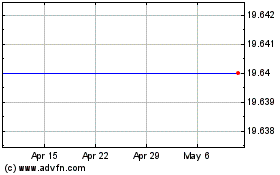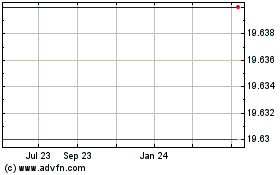By Shalini Ramachandran, Ryan Knutson and Dana Mattioli
Verizon Communications Inc. is exploring a combination with
Charter Communications Inc. that would unite two giants in search
of growth in a rapidly consolidating media and telecom landscape,
according to people familiar with the matter.
Verizon CEO Lowell McAdam has made a preliminary approach to
officials close to Charter, which has a market value of more than
$80 billion. Verizon is working with advisers to study a potential
transaction, the people said. There's no guarantee a deal will
materialize.
It is unclear whether Charter executives, including Chief
Executive Tom Rutledge, would be open to a transaction. The effort
could be complicated by Charter's ownership structure, which
includes cable tycoon John Malone and the Newhouse family.
A combination would bring together Verizon's more than 114
million wireless subscribers and what remains of its landline
business with Charter's cable network, which provides television to
17 million customers and broadband connections to 21 million.
Verizon has a market capitalization of $194 billion and more
than $100 billion in debt.
Buying Charter would take Verizon down a different path from
rivals Comcast Corp. and AT&T, who have bet big on combining
content and distribution -- Comcast, through its ownership of
NBCUniversal, and AT&T with its pending acquisition of Time
Warner Inc.
Verizon, by contrast, would be doubling down on its historic
strength in distribution, as an owner of pipes that carry web
traffic. Verizon executives have said they aren't interested in
traditional cable or satellite TV services, but they are big
believers in wires that power high-speed internet. Charter would
offer a large, dense fiber and cable network that could bolster
Verizon's coming fifth-generation wireless services, which will
require high-speed wired connections to many antennas that are
built closer to where people live, rather than one tall cell tower
covering hundreds of people. 5G networks are expected to deliver
ultra-fast internet connections wirelessly.
Both Verizon and Charter face challenges to their core
businesses. Growth in the U.S. wireless market has slowed and
pricing pressure has chipped away at profits. Furthermore, the
cable-TV business is threatened by cord-cutters and over-the-top
video services.
Any transaction would face a close regulatory review, given the
sheer size of the businesses and some overlapping services. Both
companies provide home broadband and television services in certain
markets, including the greater New York area. On its fiber-optics
network, known as Fios, Verizon has about 5.7 million high-speed
internet customers and 4.7 million TV subscribers, primarily in the
Northeast.
It would pose a big test for new antitrust enforcers under the
administration of President Donald Trump, who during the campaign
expressed concerns about media consolidation. In October, he vowed
to block AT&T Inc.'s $85.4 billion purchase of Time Warner
Inc., saying it put too much power in the hands of too few, but he
hasn't spoken publicly on the transaction since the election.
Many deal makers are hopeful a more traditional Republican
administration will be merger friendly. Mr. Trump recently
appointed Ajit Pai, a Republican, as chairman of the Federal
Communications Commission, which oversees telecom mergers in
addition to the Justice Department.
In his testimony before the Senate, Mr. Trump's selection for
Attorney General, Sen. Jeff Sessions, said he wouldn't have a
problem blocking mergers deemed anticompetitive. "I have no
hesitation to enforce antitrust law," Sen. Sessions said on Jan.
10. "There will not be political influence in that process."
To appease regulators in the event of a deal, analysts and
industry executives believe Verizon would likely spin off Charter
cable assets that overlap with its all-fiber Fios network in
markets like New York. Comcast and other cable companies would be
likely buyers of those, J.P. Morgan analyst Philip Cusick wrote in
a December research note.
Shares of Dish Network Corp., which has been considered a
potential takeover candidate for Verizon by some on Wall Street,
were down 5% in late morning trading.
Any deal with Charter would require the blessing of Mr. Malone,
whose Liberty Broadband has a 25% voting stake in the company, and
the Newhouse family, which votes a 7% stake. People close to Mr.
Malone and the Newhouses have said both aren't married to remaining
in the cable business and would sell at the right price.
Mr. McAdam had preliminary discussions with Liberty Broadband
Chief Executive Greg Maffei, a Charter board member, in recent
months, some of the people said.
However, cable executives who know Mr. Rutledge note the Charter
CEO just completed a major acquisition and is likely looking
forward to continuing his consolidation march in cable and running
Charter.
Last May, Charter vaulted ahead to be the No. 2 cable-television
provider behind Comcast Corp., with a $55 billion cash-and-stock
deal for Time Warner Cable and a $10.4 billion deal for Bright
House Networks, a regional cable TV provider. Charter has expressed
interest in offering wireless service and said last year it was
planning to resell Verizon wireless service to its own cable
customers.
At meeting with analysts in December, Mr. McAdam, the Verizon
CEO, didn't dismiss the idea of a Charter acquisition. Asked about
the potential for such a deal, McAdam replied that such a
combination "makes industrial sense," according to BTIG analyst
Walt Piecyk.
In 2014 Verizon paid $130 billion to buy Vodafone's 45% of their
wireless joint venture. More recently, Mr. McAdam scooped up
internet company AOL and agreed to buy Yahoo Inc.'s core internet
business for $4.8 billion in July. That transaction has been
delayed by Yahoo's disclosure last year of two massive security
breaches.
Buying Charter would make Verizon look a bit more like AT&T,
which became the biggest U.S. pay-TV provider two years ago when it
swallowed satellite provider DirecTV for $49 billion. AT&T now
has 25 million U.S. television customers and more than 91 million
phone subscribers.
Verizon last year sold its TV, internet and landline phone
business in California, Texas and Florida. But those operations
carried a large amount of copper wires, which aren't as good for
high-speed internet.
On Tuesday, Verizon projected 2017 sales and profits would be
flat from last year.
Write to Shalini Ramachandran at shalini.ramachandran@wsj.com,
Ryan Knutson at ryan.knutson@wsj.com and Dana Mattioli at
dana.mattioli@wsj.com
(END) Dow Jones Newswires
January 26, 2017 11:50 ET (16:50 GMT)
Copyright (c) 2017 Dow Jones & Company, Inc.
Altaba (NASDAQ:AABA)
Historical Stock Chart
From Mar 2024 to Apr 2024

Altaba (NASDAQ:AABA)
Historical Stock Chart
From Apr 2023 to Apr 2024
